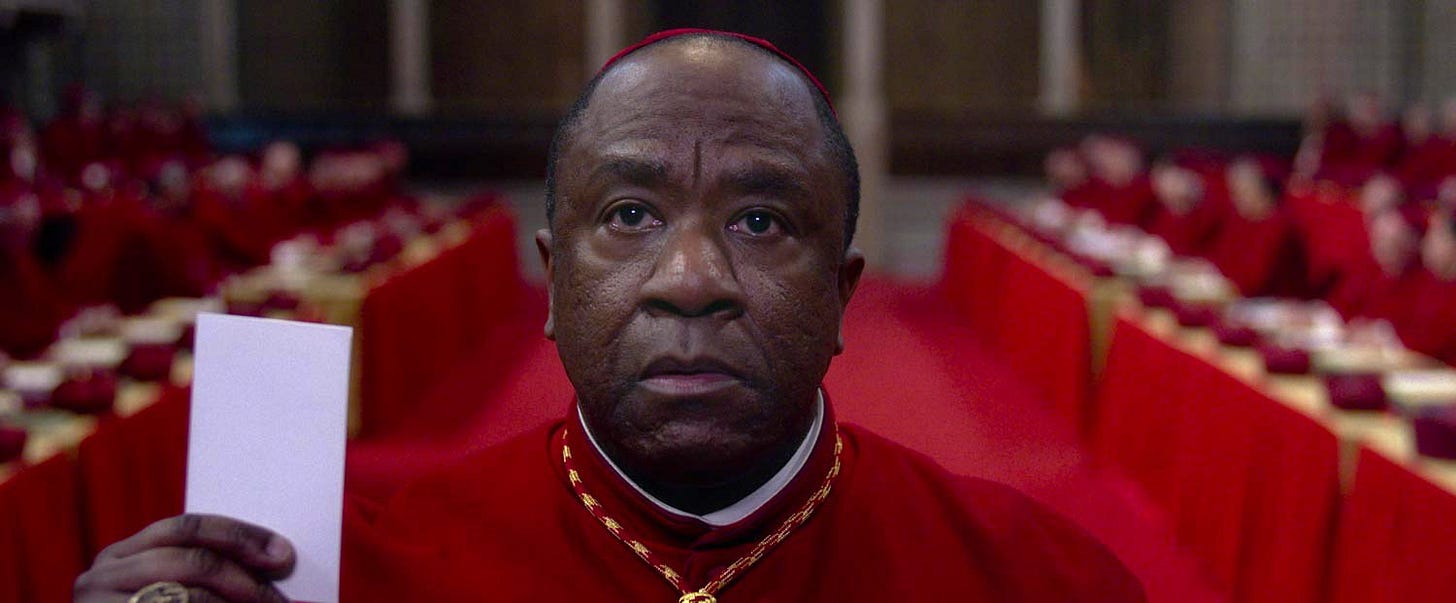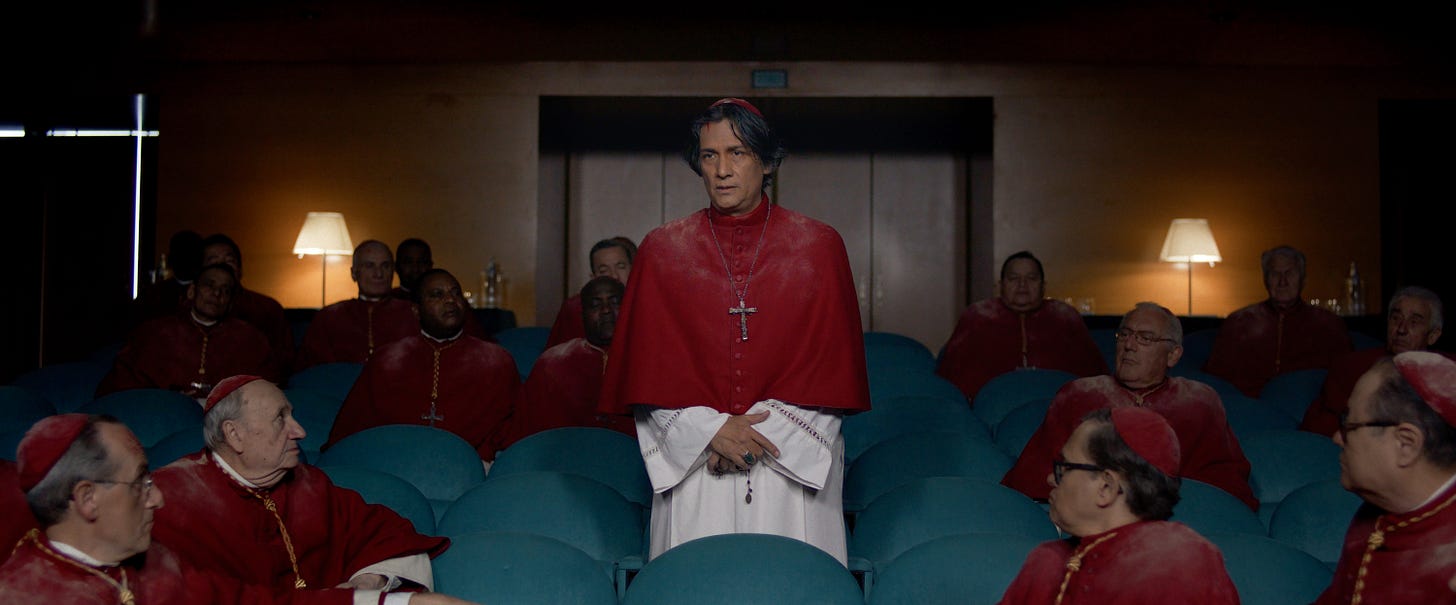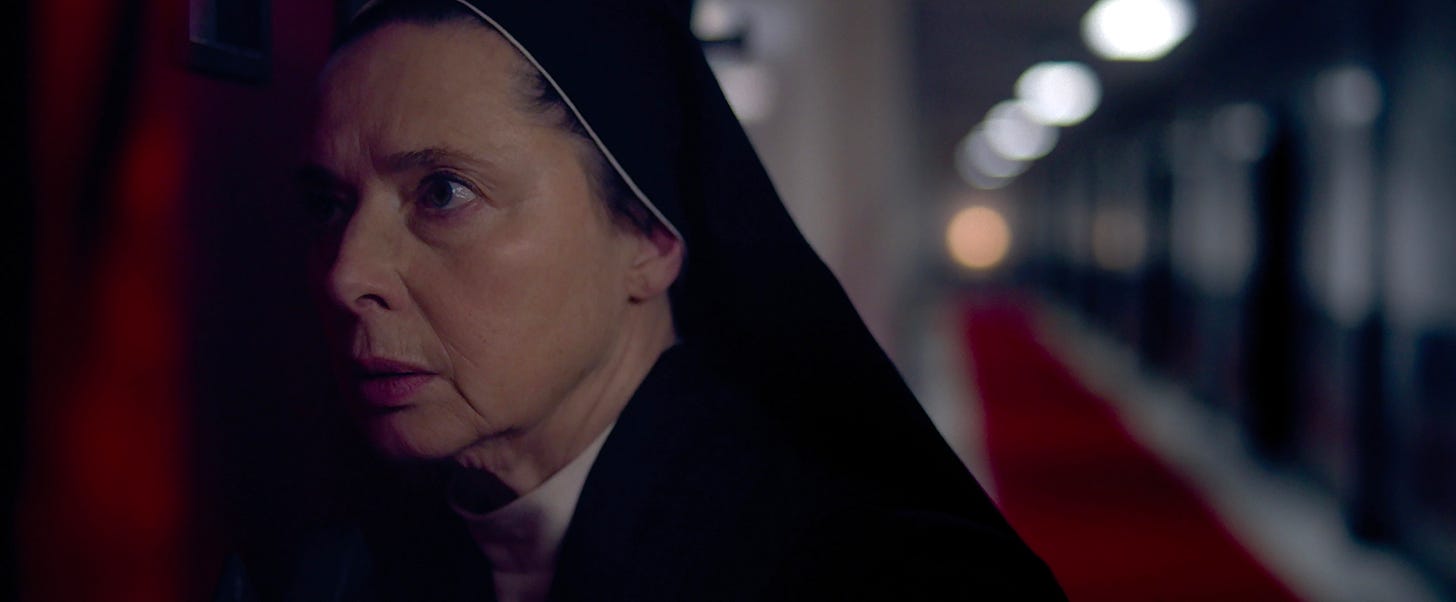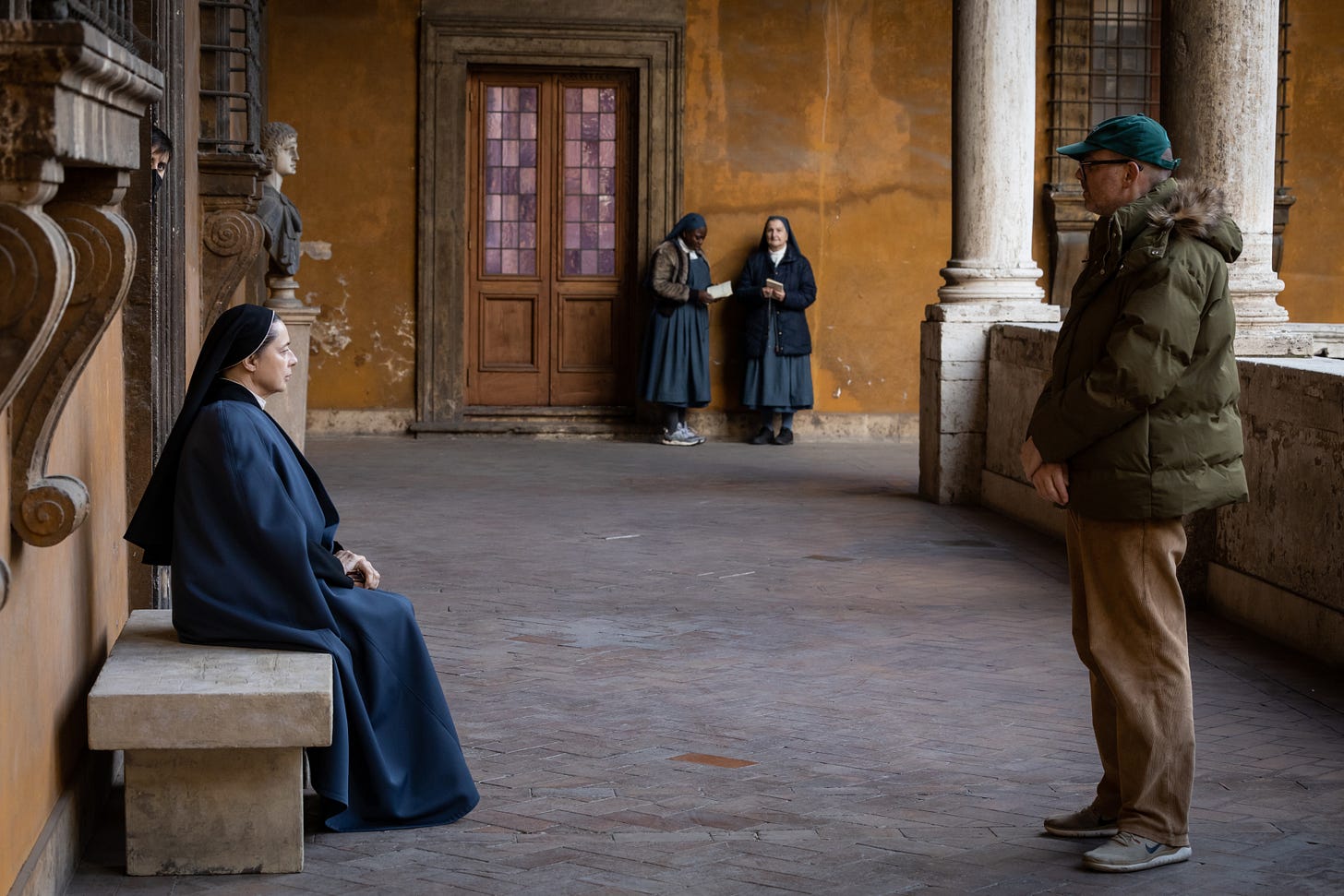'Conclave': Politics, Secrets & Shock, He Wrote
Screenwriter Peter Straughan on election drama (papal version) and sticking the landing. Plus: the impact of BAFTA, SAG, WGA, PGA noms

If an awards nomination happens but there’s no celebratory press release to promote it, did it really happen at all? That’s a question we may end up asking ourselves after these strange final two weeks of Oscar nominations voting, which has been extended and re-extended given the Los Angeles wildfires but still sort of feels like it’s not happening at all.
Last Wednesday’s SAG Awards nominations, announced while much of the city was still packing their go bags, were limited to a press release — no live announcement (originally set to be presented by Joey King and Cooper Koch) and zero reaction phone calls or e-mailed statements from the nominees. This week brought both the PGA and WGA nominations via press release as well as the BAFTA Award nominations, announced from a safe distance all the way in London but still met with an eerie quiet. I haven’t received any reaction comments from any of the nominees, even those in Europe, and I haven’t seen any published elsewhere, either.
The BAFTA nominations were originally scheduled to come out after Oscar nominations voting ended, meaning they could reveal the favorites of a voting body (of about 8,100) that has significant overlap with the Academy (approximately 9,900 voting members) without influencing the nominations themselves. But now that Oscar nominations voting doesn’t end until Friday, and especially given that voters in the U.K. — as opposed to those in Los Angeles — are more likely to have the bandwidth to pay attention to the race at all, BAFTA’s nominations might wind up being more indicative than ever of who makes the final Oscar cut.
That’s good news for Conclave, which led the BAFTA pack with 12 nominations, including one for my interviewee today, screenwriter Peter Straughan. Emilia Pérez was right behind it with 11, and both made the cut for best film, joining The Brutalist, Anora and A Complete Unknown in what very much looks like the top five of the eventual best picture Oscar nominees. All five, for what it’s worth, made the PGA top 10 as well.
For the best picture hopefuls that didn’t make the BAFTA best film list, there’s still plenty of good news to be had. Wicked earned six nominations, including for stars Cynthia Erivo and Ariana Grande, but its omission in best film was one of the more talked-about snubs (even if I’d argue that, despite shooting in England and starring the British Erivo, it’s a very Hollywood movie that wasn’t likely to score with the U.K. group!).
BAFTA’s six-person director category made room for The Substance’s Coralie Fargeat and Dune: Part Two’s Denis Villeneuve, neither of whom was among last week’s DGA nominees. Both could conceivably make their way into an Academy lineup that’s practically guaranteed to include Brady Corbet (The Brutalist), Jacques Audiard (Emilia Pérez) and Sean Baker (Anora), with a lot of competition for the remaining two slots.
Best picture hopefuls like Sing Sing and A Real Pain missed out on BAFTA’s best film list but scored other nominations that suggest they’re very much in the mix, while the strong showing for Dune: Part Two, in addition to its presence on the PGA top 10, has me wondering if the Academy might make room in the best picture category for its technical spectacle as well as Wicked’s.

What feels most certain in these uncertain times, though, is that some real shockers will emerge when the Oscar nominations are finally announced next week. So many races already felt wide open, and with the lack of consensus picks, just a few votes could make the difference between an embrace and a snub. Watching Jamie Lee Curtis pick up a BAFTA supporting nomination for The Last Showgirl, just a week after both she and Pamela Anderson got SAG Awards nods, has me wondering if that movie is poised to surge even more.
The strong BAFTA showing for Blitz likewise makes me wonder if that Steve McQueen film, written off by most Academy watchers months ago, could show up with Oscar nominations in multiple categories. BAFTA nominated Sebastian Stan for The Apprentice, which isn’t even the movie he won the Golden Globe for a week ago. Anything seems possible!
With L.A.’s awards voters at best distracted and at worst devastated, it seems inevitable that — extension or no — Oscar voting turnout will be lower in Southern California. But everyone in the Academy knows someone in Los Angeles, no matter where they live, and it’s hard to imagine anyone in that voting body not feeling the strain of the past week.
How that will manifest in the nominations is truly anyone’s guess. Despite my best efforts over at Ankler Pundits, I am assuming that this year, more than usual, nobody knows anything.
Tales From the Conclave

Conclave screenwriter Peter Straughan is as familiar as anyone with that old Hollywood adage. Despite having his name on prestige hits like Tinker Tailor Soldier Spy — for which he earned a 2012 Oscar nomination — and the Wolf Hall miniseries, the Brit promises he doesn’t have the secret for what it takes to make a tony literary adaptation work.
“I swear to God, if I did, I would make sure I did it every time,” Straughan tells me. When it came to Conclave, he adds, “If I was looking at the things I was working on, I would never in a million years have thought, ‘Well, that’s the one that’s going to be the hit and connect with an audience.’”
Conclave is not only a box office hit, grossing $76 million worldwide and counting (on a reported budget of $20 million), but it’s earned a wide range of acclaim for Straughan, director Edward Berger and several members of its cast, particularly star Ralph Fiennes. Straughan won the Golden Globe for best screenplay, earned BAFTA and Critics Choice nominations and seems very likely to follow up with an Oscar nomination for original screenplay next week.
The 56-year-old scribe knows that when you’re on the awards campaign trail, you’re supposed to highlight how challenging the project was, how much genius it took to bring the whole thing together. But Straughan can’t bring himself to act as if adapting Robert Harris’ 2016 novel was any kind of slog.
“It was a gift for an adaptation because it just sort of fell into a film shape off the page,” he tells me. “There’s that myth that you have to have suffered if the film’s going to be any good. So it slightly surprises me that this film worked, because for me it was just a really happy experience all the way through.”
On the other hand, speaking to me from his home in the U.K. yesterday — and allowing me to ask lots of spoilery questions about how the script came together — he can’t hide just how much careful work was required to translate the novel to the screen. The twisty story set at the Vatican during a papal election required doling out information in precise and curated doses, so that the audience could be surprised but not blindsided by the story’s many turns.
When it came to the film’s final twist, a scene that earned laughs, gasps and applause when I saw it at the Toronto International Film Festival, Straughan had to make very careful changes from Harris’ book, both to fit the cinematic adaptation and to keep the story feeling up to date for 2024.
Here, Straughan walks me through some of those changes, including how the final shot of the movie became something he never could have written — but works perfectly all the same. Spoilers ahead!
The Sound of Silence
When you get someone as legendary as Isabella Rossellini to play what’s written as a tiny role, do you feel the pressure to give her more to do? That’s something Straughan and Berger faced when the Italy-born icon signed on to play Sister Agnes, the head of the order of nuns who tend to the cardinals during their gathering to elect a new pope. But given the patriarchal nature of the church, the sisters are rarely expected to be noticed at all.
“The audience are kind of waiting for her to speak, because she’s Isabella Rossellini,” Straughan acknowledges. But her silent presence, he ultimately decided, held its own power, which linked into the broader themes that emerge in the film’s final scene. With so much wordless screen time for Rossellini and her sisters, Straughan says, “You become hyper-aware of the silence. I suppose I always felt like that was one of the engines of the film — that there was a kind of silent chorus.”
He had initially included an additional final scene for Rossellini, in which she meets once more with Fiennes’ Cardinal Lawrence and listens as he shares his doubts about how the whole conclave process played out. But as he did so many times throughout writing Conclave, Straughan eventually realized he could say less.
“That thing where you’re trying to explain the ending or the message to the audience . . . it always starts to make you feel uneasy,” Straughan says. “Then you get someone like Ralph and someone like Edward, and you don’t need the words.”
Secrets and Truths (BIG SPOILER AHEAD!)

In both Harris’ novel and in the film, Mexican-born Cardinal Benitez (Carlos Diehz) — moments after he is elected Pope — confesses to Lawrence that he was in fact born intersex and had considered a surgery to remove his female genitalia before deciding against it. It’s a revelation that calls into question the many rigid divisions between genders that exist in the church, but it also carries profound resonance in our broader world — and a strong potential for backlash.
Straughan’s changes to that scene (vs. the version in the novel) were subtle — but they connected Benitez to the homily Lawrence has given at the beginning of the conclave, about his wish for a Pope who doubts. “I know what it is to exist between the world’s certainties,” Benitez tells a stunned Lawrence after revealing his complex secret.
“It was the thing I chewed over the most and worried about the most,” Straughan says of the revelation. “If it was clumsily done, it could be painful and offensive to people for different reasons.” Though the scene has its humor as well — Lawrence, who has been dealing with one crisis after another, seems exhausted by yet another secret cracked open — but Straughan credits Diehz with landing it exactly where it needed to be.
“Every time I’ve seen with an audience, you can feel him settle it down again and calm it and make it quite beautiful,” Straughan says of Diehz, 53, who launched his acting career in 2020 after 30 years as an architect. “I think that’s a real testament to that little section of the performance that he gives.”
The Turtles Escape
Conclave excels because of its attention to the book’s fine details, from the bland hotel rooms where the cardinals stay in the Vatican to the contents of the deceased Pope’s nightstand. But the book was missing one of the film’s most indelible and very true details — a pond full of turtles that really did keep escaping.
We see Benitez develop an affection for the rogue turtles, and at the end of the film Lawrence returns one to its pond with a similar tenderness. It’s a gesture that shows the audience that Lawrence has made his peace with Benitez’s revelation — and that he may have found his way back to his own faith as well.
“Ralph’s character is struggling with his faith. He feels like he’s praying but not getting an answer,” Straughan says. “I was thinking, could we thread in some not-miraculous things, ordinary things, that if you’re religious, you might be trying to decode them and think, ‘Is that a message?’”
The Sisters Get the Last Word
Straughan always knew he didn’t want the script to end where the book did, fairly abruptly after Benitez’s revelation. For four or five drafts, he says, the final scene saw Benitez stepping onto the balcony for the first time as Pope, with the camera pulling back at last from the claustrophobic confines of the Vatican.
But it was in the editing room, he says, that Berger happened upon the film’s true final shot — a group of three nuns, seen from a distance as Lawrence peers out a window, chattering happily and going about their day. “You wouldn’t write that scene, because it wouldn’t look like anything on the page,” Straughan says. “But when someone says to you, ‘Do you think this is the end?’ You suddenly go, ‘Oh yeah, that’s a great end.’ I love the way films are still being discovered in the edit.”
My Own Last Word
The Ankler is still matching all new paid subscriptions with a contribution to the Wildfire Recovery Fund at the California Community Foundation, and I also wanted to take a moment to promote a GoFundMe that I’ve taken on as a personal campaign. I found this page for Ed Housep via a campaign for Ben Mekler, a screenwriter who was Housep’s neighbor in Altadena before both lost their houses. Ed and his family don’t have insurance so their situation is particularly precarious. If you’re feeling overwhelmed by the amount of worthy causes out there, give to this one and then boost it within your own networks so we can get them past their $35,000 goal. The way people in Los Angeles have stepped up for one another in the past week has been remarkable to witness, and I’m grateful to be able to contribute even from afar.







